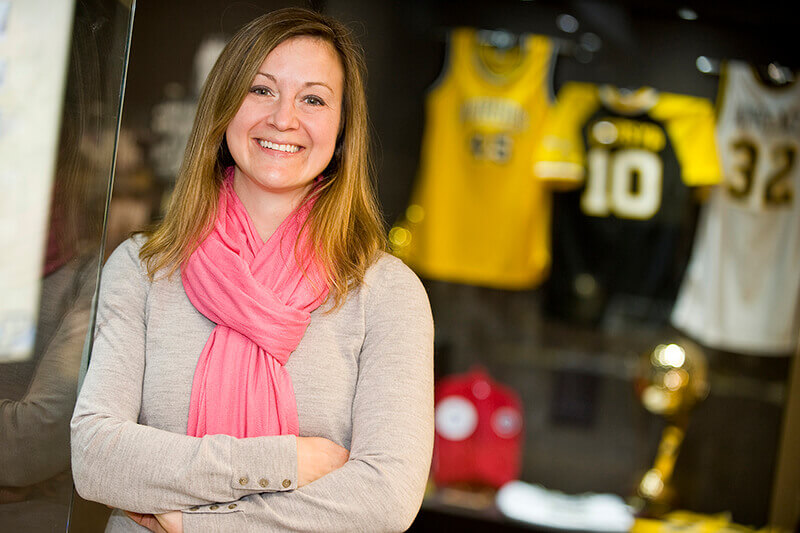September 5, 2019
Q&A with Cheryl Cooky, University Senate chair
 Cheryl Cooky, 2019-20 chair of the University Senate. (Purdue University photo)
Download image
Cheryl Cooky, 2019-20 chair of the University Senate. (Purdue University photo)
Download image
Cheryl Cooky, associate professor of American studies and women's, gender and sexuality studies in the College of Liberal Arts, will lead her first meeting as chair of the University Senate for 2019-20 on Sept. 9. Here, Cooky answers questions from Purdue Today about her service with the Senate and goals for the year.
How long, and in what positions, have you worked at Purdue?
I have been at Purdue since August 2009, so 10 years now. I was hired as an assistant professor with a joint appointment in Health and Kinesiology and Women’s Studies. After the creation of the College of Health and Human Sciences, my appointment moved to a full appointment in the College of Liberal Arts. Currently I am in the School of Interdisciplinary Studies (in CLA) with a joint appointment in American Studies and Women’s, Gender, and Sexuality Studies.
Why did you decide to become involved in University Senate?
Several years ago, my department head asked for nominations for the election to decide our representative to the Senate. Given I was tenured and in relatively small programs where many of my other tenured colleagues were in administrative roles as program directors, I thought it my obligation to take on some of these other service roles in order to evenly distribute the burden of service across the department, and to protect junior faculty. I had also served on the Faculty Affairs Committee on College of Liberal Arts Senate, as well as on the Faculty Affairs Committee in HHS. I enjoyed my work on these committees and thought I might have something of value to contribute in my role as senator. At the time, I was interested in learning more about how the University operates and thought serving on the University Senate may offer an entry point.
What did you learn as vice chair or as a committee member that will assist you as chair this year?
I learned a lot last year as vice chair. Beyond all the policies and procedures -- and by no means do I claim to be an expert on parliamentary procedure, luckily we have Professor Joe Camp in that role! -- I have learned about the importance of representing the faculty, staff, and students and working with the administration. The immediate past chair, Natalie Carroll, did a wonderful job, and I have gained a lot from observing her in this role. My perspective has also changed since I first joined the Senate. Last year I observed how we can achieve shared goals when we work together with the administration. I wasn’t sure before whether that was possible. I also learned that sometimes getting to know people goes a long way in moving things forward.
What will the Senate be working on during the upcoming academic year?
We have a number of items we hope to address, some old business from last year, and some new business that will arise as new initiatives, decisions and policies are implemented. Of course, the standing committees have their resume of items of which they will continue to address. As for the collective body, President Daniels’ proposal to address civics literacy is under consideration, ongoing from last year. Academic rigor is another issue that I anticipate the Senate will be considering. We look forward to working with Dr. John Gates, the new vice provost for diversity and inclusion, and supporting the exciting initiatives coming out of the Division of Diversity and Inclusion, including the “Maximizing Student Potential” initiative, among others. The Senate will also address the myriad questions and concerns we receive from faculty, students and staff and do our best to address those in a timely manner. I’m certain there are other agenda items on my list I am forgetting, but needless to say this will be a busy year for the Senate.
What are your own goals as the chair of the Senate? What do you hope to have contributed as chair to the Senate and to the University once your term ends?
My goals are to be as successful as possible in serving as a voice for faculty/campus issues and concerns and to work in a productive way with the administration, President Mitch Daniels, and the Board of Trustees in advancing Purdue’s mission and strategic plan. I hope to have fostered positive and productive relationships both within and outside of the Senate, to have improved communications between senators and their departmental constituents, and to provide advice and guidance that is representative of faculty needs and concerns. In addition to working with key stakeholders in the Senate and administration, I hope to have made a positive impact with regard to equity and diversity at Purdue.
What would you like faculty and staff to know about the Senate?
In order to be successful in achieving the educational objectives of Purdue University, the Senate needs committed, engaged, and involved faculty to serve as senators and on Senate committees. We are only as good as the sum of our parts. Departments and colleges should take care to elect senators who are willing and able to attend Senate meetings, communicate Senate business, represent their faculty, students, and staff, and report back to their departments. Departments and colleges should also recognize and reward faculty so as to ensure those who do serve are appropriately recognized for their service.
How can faculty/staff get involved?
Faculty and staff can get involved by volunteering to serve on the Senate and Senate committees. Faculty and staff can also get involved by providing input and ideas to their elected Senate representatives.

